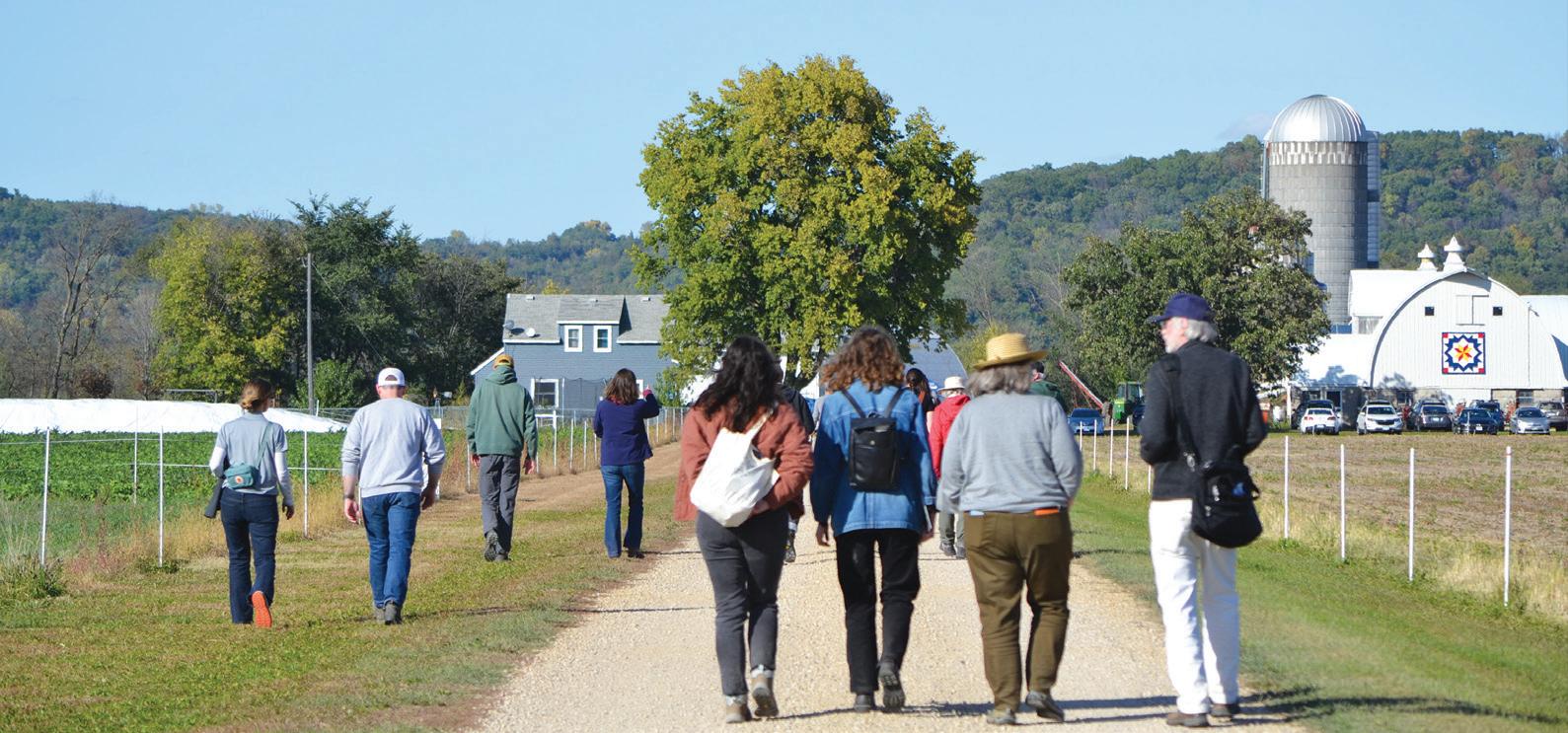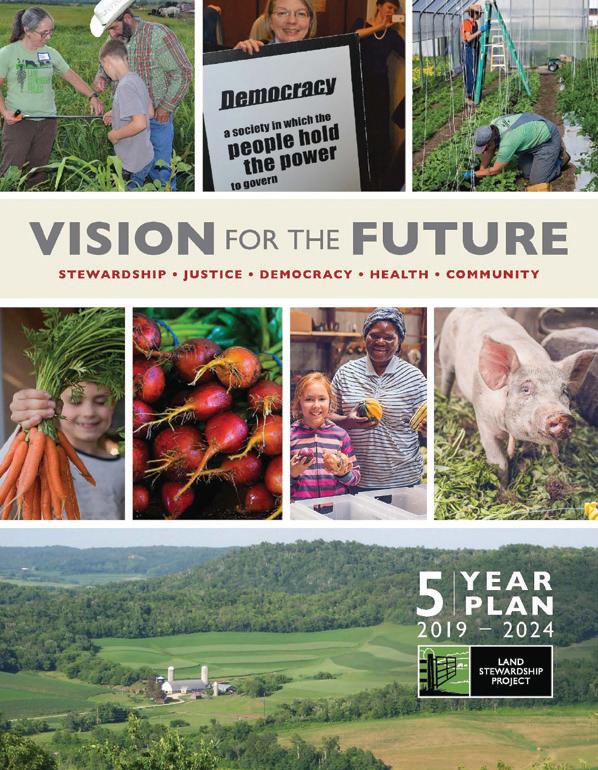
7 minute read
Roots Speaking Up for Integrity
LSP’s Members Offer a Powerful Voice at a Critical Time
By Scott Elkins
Advertisement
When I became the Land Stewardship Project’s new executive director in June, it was a bit of a homecoming for me — I had worked as an organizer for the organization back in the 1990s. A lot has changed in the intervening years, but one constant is that LSP has always emphasized engaging farmers and others in a way that gives people a powerful, collective voice. Making that voice heard is more critical than ever, and LSP is in a prime position to do exactly that.
For example, there’s the issue of food with integrity. We have a world where people feel increasingly disconnected from the origins of their food. Basically, what are Cheetos? They have some root in things that grow from the ground, but at their core they are an industrial product. The value-added of that product and where the money is going to when a person buys that product is not in the hands of farmers. It’s in the hands of manufacturers and marketers and industrialists who have an agenda to separate the consumer from as much money as they can; and to separate the farmer from as much of their income as they possibly can.
I think about the systems that we’ve set up that are going to keep pushing people in the direction of the Cheetos side of the food economy. What kind of solutions can LSP and its members provide to help drive things in a different direction? Our recent revamping of LSP’s Community Food Systems (see page 14) initiative and its work to develop community food webs is an exciting step toward creating a system based on integrity.
Another important issue is climate change. No doubt farmers are experiencing the impacts of climate — we saw that in particular during the record-breaking summer we just had. Agriculture accounts for, depending on how you gauge it, 15% to 30% of climate-relevant emissions. So, farming is not only impacted negatively by climate change, it’s also one of the sources of this problem. As a result, I believe over the next five to 10 years there’s going to be a revolution in agricultural policy and funding that’s going to be driven by the demands of climate change. Small and mid-sized farm- of issues while also building up and restoring rural economies and rural culture. ers using regenerative practices hold the key to building a climate-smart food system.
Our work around soil health (see page 16) is a good example of how listening to the voices of farmers can lead to real results. In recent years, we have been successful in building networks that are engaging farmers who are interested in adopting practices that build resilient, regenerative soils. These networks have also made great progress in reaching out to conventional farmers who may not see themselves as part of the so-called “regenerative ag movement,” but nonetheless know change is needed on their own farms, and in agriculture in general. This work has its roots in farmers telling us they needed such support in transitioning to a different approach to producing crops and livestock.
Now, corporate interests have a game plan when it comes to addressing climate change. Some of those solutions may have merit, and some may not. But if all we’re thinking about is reducing climate emissions and the only voices that we’re listening to are corporate voices, we’re going to see increased consolidation and more squeezing out of small and mid-sized farmers.
There’s great opportunity for an organization like LSP to talk about climate solutions that increase the number of small and mid-sized producers, that push us away from consolidation and more towards regional food systems and innovative production strategies that fundamentally get to the heart
But we also need to keep in mind that changes in agriculture don’t happen in a vacuum. I was recently visiting a farmer in western Minnesota who’s doing all the right things and engaging in all the practices that build healthy soil. He talked to me about standing on the fenceline he shares with the neighboring farm, which is doing row crops in a purely conventional way, and thinking to himself about how that farmer is making more money and doing less work on a week-to-week basis than he’s having to do. Doing the right thing should not be that much of an uphill climb. That brings up the issue of how we can shift policy on the state level so that farmers who are being innovative while addressing climate change and building up rural economies are the ones who are on the receiving end of the bulk of federal and state incentives and subsidies. Shifting policy in that way serves the interest of not only the climate, but rural economies and rural communities. Again, by engaging the voices of our members at the Minnesota Legislature, LSP has attained some major victories in recent years when it comes to public support of regenerative farming and community food systems (see page 10).
However, we must face the fact that we’re living in a country where it’s getting harder and harder to get important stuff done
Voices, see page 4… when it comes to policy, including when it comes to the Farm Bill that’s currently being debated in Congress (see page 12). We are increasingly seeing issues that should cut across political divides actually getting shoved into corners, and getting caught in that chasm separating Democrat and Republican, populous, progressive, conservative — however you want to label those things.
That’s keeping us from doing good stuff no matter what side of the aisle you’re sitting on.
And I think those divides are showing up in a lot of different ways. For example, there’s geography — the urban and rural split. It feels like LSP, with a balanced membership of rural residents and farmers, and urban and suburban folks who are interested in rural policy, is an organization that can reach across such a split and get things done.
So, how do we start doing that? I think we do that by making something like agriculture relevant to folks, even if they aren’t farmers. We need to talk about the impacts it has on the choices they make in the supermarket and the quality of the air and water in their communities, while tapping into the idea that rural communities play a key economic and cultural role in the foundation of American society.
I think the other thing we have to own up to is how differences of race, immigration status, political affiliation and other forms of identity are being exploited by interests that benefit from endlessly escalating conflict. We can’t allow that to happen. Creating a future for rural spaces has to start with pushing back against division, and by boldly identifying and taking apart the barriers that keep many folks from feeling that they are welcome and able to thrive in rural (and urban) spaces. Black and brown folks, Indigenous folks, recent immigrants, and other people who bring unique identities and ideas are all essential partners in our shared and vibrant rural future.
Along those lines, I’m excited about the surge of interest we’re seeing by folks from diverse racial and cultural identities in our Farm Beginnings (see page 27) course. And I’m inspired by the way our Farm Beginnings staffers are learning and shaping the curriculum to be responsive to an expanded set of perspectives and needs. That growth is also happening among Farm Transitions organizers as they develop land access initiatives that build opportunities for people to have an ownership stake in landscapes that they didn’t feel welcome in previously (see page 7).
LSP farmers and members recognize and appreciate the idea that diversity of farming practices is strength. Well, diversity of backgrounds, along with diversity of cultures and insights, is also a strength. Keeping our minds and hearts open to change and growth is a challenge, and it’s what will turn our boldest dreams into reality.
As LSP wraps up its 41st year of working to “keep the land and people together,” we face a choice: we can have a rural America that is about consolidation, depopulation, and industrial-scale agriculture — or it can be a future that’s about small and mid-sized farms proliferating, as well as vibrant communities that engage people from all sorts of cultures, races, and backgrounds, and that feed all of us healthy food with integrity.

I’m proud to be leading an organization that is making the latter choice. p
Scott Elkins can be reached at selkins@ landstewardshipproject.org.
Give it a Listen
Episode 319 of LSP’s Ear to the Ground features LSP executive director Scott Elkins talking about why the organization is well-placed to make a positive difference in creating a farm and food system based on integrity: landstewardshipproject.org/podcast/earto-the-ground-319-right-place-right-time.
LSP’s Long Range Plan: 2019-2024
The Land Stewardship Project has outlined its long range goals and how we will go about achieving them in Vision for the Future: 5 Year Plan 2019-2024. The plan is based on five core values:
➔ Stewardship is the value of living in right relationship with the land and all that is connected to it: the soil, the water, the air, the plants, microorganisms, animals, and our climate. It means giving to the land and receiving from it, and caring about the entire biotic community. Conservationminded farmers who live on the land, farm it, and care for it are essential to stewardship of farmland.
➔ Justice means there is economic, racial, and gender equity for farmers, workers, and all those who are engaged in the food and agriculture system. It means the achievement of related rights like food sovereignty for all communities, and high quality healthcare for everyone.
➔ Democracy means a society in which the people hold the power to govern, in which those people directly impacted by issues name solutions, set priorities, and win change. It means the health and well-being of people and the land are put before corporate profits.
➔ Health is the value of nourishing the beauty, function, and vitality of an ecosystem made up of people, landscapes, plants, animals, soil, and water. The health of the land is a gift that current generations are obligated to provide for future generations.
➔ Community is the value of understanding our interdependence and caring for the relationships that sustain each of us. Living in community we are more resilient, creative, resourceful, and powerful — we have greater ability to be the change we seek in the world.
The plan is at landstewardshipproject. org/long-range-plan. For paper copies, call 612-722-6377.








